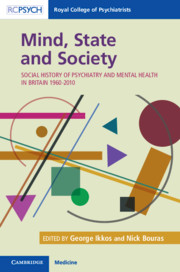94 results
Happy times, careers and happenstance in UK psychiatry: time, timeliness, timelessness, eternity and contemporality
-
- Journal:
- BJPsych Bulletin , FirstView
- Published online by Cambridge University Press:
- 07 August 2024, pp. 1-3
-
- Article
-
- You have access
- Open access
- HTML
- Export citation
Metacommunity: the current status of psychiatry and mental healthcare and implications for the future
-
- Journal:
- BJPsych International , FirstView
- Published online by Cambridge University Press:
- 16 May 2024, pp. 1-4
-
- Article
-
- You have access
- Open access
- HTML
- Export citation
Madness and society in Britain
-
- Journal:
- BJPsych Bulletin / Volume 47 / Issue 3 / June 2023
- Published online by Cambridge University Press:
- 09 August 2022, pp. 152-156
- Print publication:
- June 2023
-
- Article
-
- You have access
- Open access
- HTML
- Export citation
Part II - The Cogwheels of Change
-
- Book:
- Mind, State and Society
- Published online:
- 17 June 2021
- Print publication:
- 24 June 2021, pp 69-200
-
- Chapter
-
- You have access
- Open access
- HTML
- Export citation
Contributors
-
- Book:
- Mind, State and Society
- Published online:
- 17 June 2021
- Print publication:
- 24 June 2021, pp xvi-xxviii
-
- Chapter
-
- You have access
- Open access
- HTML
- Export citation
Part I - Social and Institutional Contexts
-
- Book:
- Mind, State and Society
- Published online:
- 17 June 2021
- Print publication:
- 24 June 2021, pp 3-68
-
- Chapter
-
- You have access
- Open access
- HTML
- Export citation
Acknowledgements
-
- Book:
- Mind, State and Society
- Published online:
- 17 June 2021
- Print publication:
- 24 June 2021, pp xv-xv
-
- Chapter
-
- You have access
- Open access
- HTML
- Export citation
Index
-
- Book:
- Mind, State and Society
- Published online:
- 17 June 2021
- Print publication:
- 24 June 2021, pp 397-406
-
- Chapter
-
- You have access
- Open access
- HTML
- Export citation
Contents
-
- Book:
- Mind, State and Society
- Published online:
- 17 June 2021
- Print publication:
- 24 June 2021, pp v-viii
-
- Chapter
-
- You have access
- Open access
- HTML
- Export citation
Foreword
-
- Book:
- Mind, State and Society
- Published online:
- 17 June 2021
- Print publication:
- 24 June 2021, pp ix-xiv
-
- Chapter
-
- You have access
- Open access
- HTML
- Export citation
Epilogue: Mind, State, Society and ‘Our Psychiatric Future’
- from Part IV - Special Topics
-
-
- Book:
- Mind, State and Society
- Published online:
- 17 June 2021
- Print publication:
- 24 June 2021, pp 393-396
-
- Chapter
-
- You have access
- Open access
- HTML
- Export citation
Part III - Implications in Practice
-
- Book:
- Mind, State and Society
- Published online:
- 17 June 2021
- Print publication:
- 24 June 2021, pp 201-314
-
- Chapter
-
- You have access
- Open access
- HTML
- Export citation
Part IV - Special Topics
-
- Book:
- Mind, State and Society
- Published online:
- 17 June 2021
- Print publication:
- 24 June 2021, pp 315-396
-
- Chapter
-
- You have access
- Open access
- HTML
- Export citation
Introduction: Mind State and History in Britain 1960–2010
-
-
- Book:
- Mind, State and Society
- Published online:
- 17 June 2021
- Print publication:
- 24 June 2021, pp 1-2
-
- Chapter
-
- You have access
- Open access
- HTML
- Export citation
Copyright page
-
- Book:
- Mind, State and Society
- Published online:
- 17 June 2021
- Print publication:
- 24 June 2021, pp iv-iv
-
- Chapter
-
- You have access
- Open access
- HTML
- Export citation

Mind, State and Society
- Social History of Psychiatry and Mental Health in Britain 1960–2010
-
- Published online:
- 17 June 2021
- Print publication:
- 24 June 2021
-
- Book
-
- You have access
- Open access
- Export citation
Chapter 7 - Guidance on Rating
-
- Book:
- Camberwell Assessment of Need for Adults with Developmental and Intellectual Disabilities
- Published online:
- 15 February 2021
- Print publication:
- 04 March 2021, pp 22-26
-
- Chapter
- Export citation
Chapter 6 - Training for CANDID
-
- Book:
- Camberwell Assessment of Need for Adults with Developmental and Intellectual Disabilities
- Published online:
- 15 February 2021
- Print publication:
- 04 March 2021, pp 18-21
-
- Chapter
- Export citation
References
-
- Book:
- Camberwell Assessment of Need for Adults with Developmental and Intellectual Disabilities
- Published online:
- 15 February 2021
- Print publication:
- 04 March 2021, pp 90-92
-
- Chapter
- Export citation
Appendices
-
- Book:
- Camberwell Assessment of Need for Adults with Developmental and Intellectual Disabilities
- Published online:
- 15 February 2021
- Print publication:
- 04 March 2021, pp 27-89
-
- Chapter
- Export citation

